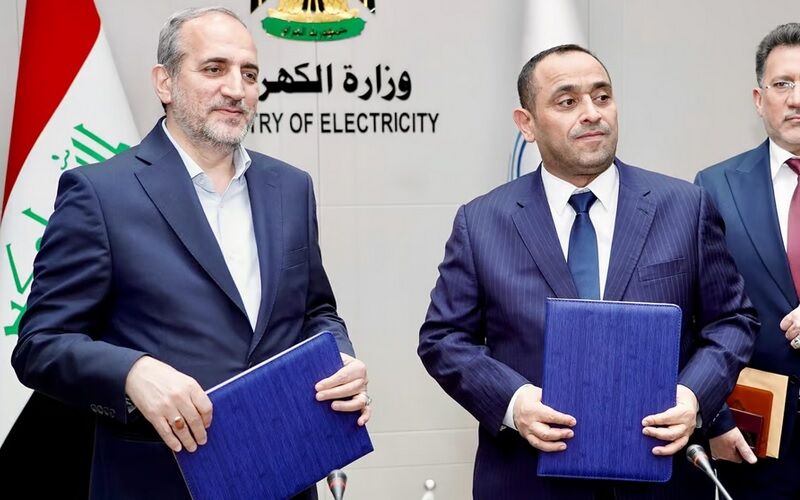The Oil Ministry has put great emphasis on promoting energy diplomacy since the 13th administration took office in August 2021.
To achieve the strategic goal by relying on domestic capacities, all affiliated companies and groups of the Oil Ministry, including the National Iranian Gas Company (NIGC), have put the talks with other countries, particularly the neighboring states, on the agenda in an effort to earn foreign currencies.
The extension of the contract on exporting Iran’s gas to Iraq for the next five years on March 27 was the latest move to attain the objective.
The contract extension was signed by Majid Chegeni, the NIGC managing director, and Ziyad Ali Fazel, Iraq’s minister of electricity, in Baghdad.
Based on the contract, the volume of gas exports to Baghdad and Basra will vary during the warm and cold periods of the year.
Based on two contracts, Iran exported around 52 billion cubic meters (bcm) of gas worth $15 billion to Iraq in the past five years.
Fazel has underlined that Iraq’s power plants are in dire need of Iran’s gas to generate electricity, calling Iran a good economic partner, which has met his country’s needs in critical conditions.
Untangling a ‘mess’
Iran has taken major steps to extend its contract on exporting gas to Türkiye and untangle what is once described as a “mess”.
Turkish Minister of Energy and Natural Resources Alparsalan Bayrakta held talks with Iran’s Oil Minister Javad Owji on April 4, expressing his country’s willingness to extend the gas contract during a session on technical issues.
Speaking at the 8th meeting of Iran-Türkiye High-Level Cooperation Council in Ankara in January 2024, Iranian President Seyyed Ebrahim Raeisi said, “Given the existing capacities in the two states, Iran-Türkiye annual trade volume could hit $30 billion.”
Raeisi and his Turkish counterpart Recep Tayyip Erdogan also met at the 16th Economic Cooperation Organization (ECO) Summit in Tashkent, the capital city of Uzbekistan, in November 2023, showing their interest in extending the gas contract.
Iran exported over 156 billion cubic meters of gas to Türkiye in the past 28 years, and the two sides are keen to extend the strategic deal.
Fruitful talks with Pakistan
Tehran’s negotiations with Islamabad on the revival of their contract for exporting gas to Pakistan have borne fruit, as the latest news and reports show that Islamabad has commenced the work after a 10-year hiatus to begin the construction of the 80-kilometer section of the Pakistan-Iran gas pipeline from Gwadar to a point where it can be connected with the Iranian section of the project.
The development comes amid the United States’ explicit opposition to the bilateral project.
Speaking to congressmen during a congressional hearing in Washington last month, U.S. Assistant Secretary of State for South and Central Asia Donald Lu stated that the United States opposes the Iran-Pakistan gas pipeline project and is exerting maximum efforts to prevent its construction.
The U.S. official said Washington was in contact with Islamabad on the matter.
Reacting to Lu’s remarks, Pakistani Foreign Ministry spokesperson Mumtaz Zahra Baloch underlined that since the pipeline is being constructed inside the country's territory, "we do not believe there is room for any objections by any third party”.
Last month, Pakistan's Petroleum Minister Musadik Malik said Islamabad's position on the gas transfer project with Iran is not merely an expression of desire but "the need of the hour".
Other achievements
Iran has been exporting gas to Armenia according to their gas-electricity swap contract since the incumbent government took over in August 2021.
On August 15, 2023, Tehran and Yerevan extended their agreement until 2030 under which Iran exports more natural gas to Armenia in exchange for electricity and the ratio of bartering gas with electricity was amended in favor of Iran’s NIGC.
In another move toward promoting energy diplomacy, Owji announced in May 2023 that Iran’s gas debt to Turkmenistan has been cleared, saying the debt was fully paid in three installments over the past 20 months.
Following the debt settlement, the imports of gas from Turkmenistan resumed and volume of gas swap rose to 8 billion cubic meters per day from 4.5 bcm/d.
Iran’s participation in the 7th Gas Exporting Countries Forum (GECF) Summit of Heads of State and Government in the Algerian capital Algiers in March 2024 was also among important developments.
Delivering speech at the summit, President Raeisi made strategic proposals, which will undoubtedly play an effective role in strengthening Iran’s position in the assembly.


Your Comment